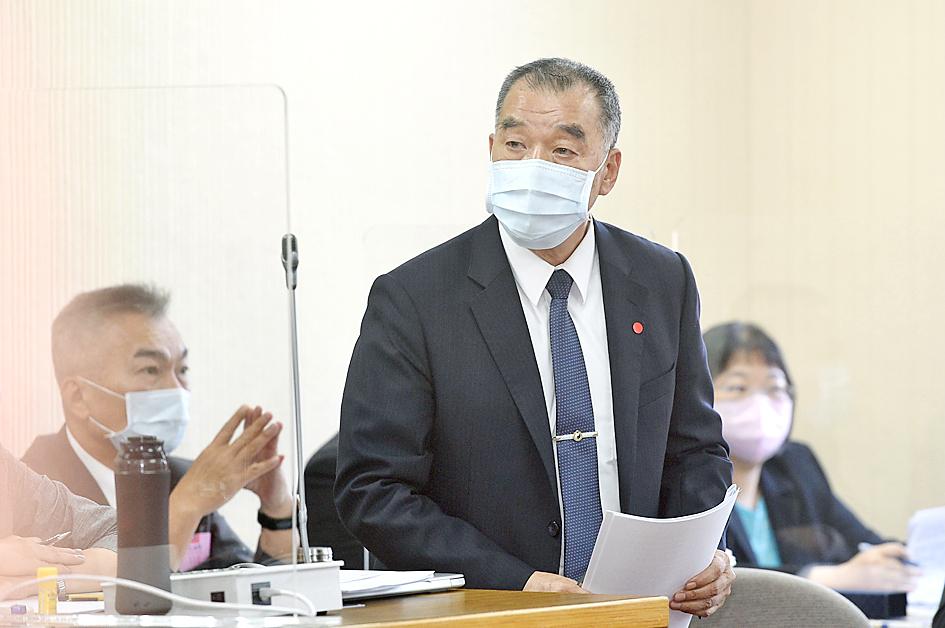Military tensions with China are at their worst in more than 40 years, Minister of National Defense Chiu Kuo-cheng (邱國正) said yesterday, days after record numbers of incursions by Chinese aircraft into Taiwan’s air defense identification zone (ADIZ).
Tensions have hit a new high between Taipei and Beijing, and the Chinese People’s Liberation Army (PLA) aircraft have repeatedly flown through Taiwan’s ADIZ.
Over a four-day period beginning on Friday, Taiwan said that nearly 150 PLA military aircraft entered its ADIZ, part of a pattern of what Taipei calls Beijing’s continued harassment of the nation.

Photo: George Tsorng, Taipei Times
At a meeting of the Legislative Yuan’s Foreign Affairs and National Defense Committee yesterday, Chinese Nationalist Party (KMT) Legislator William Tseng (曾銘宗) asked Chiu about current military tensions with China and whether he agreed with a May report in The Economist, which said that Taiwan is the “most dangerous place on Earth.”
That is just the opinion of the foreign media, but the situation is the “most serious” in the more than 40 years since he joined the military, Chiu said.
“For me as a military man, the urgency is right in front of me,” he said.
China has the ability to invade Taiwan and its military would have the capability of mounting a “full scale” invasion by 2025, Chiu added.
“By 2025, China will bring the cost and attrition to its lowest. It has the capacity now, but it will not start a war easily, having to take many other things into consideration,” he told the committee which, with the legislature’s Finance Committee, is reviewing a special military purchase act of NT$240 billion (US$8.6 billion) for indigenous weapons, including missiles and warships.
In response to Democratic Progressive Party Legislator Michelle Lin’s (林楚茵) queries about the guiding principle behind Taiwan’s military reactions, Chiu said: “Our military holds to the principle that we will not fire the first shot.”
Taiwanese pilots are under great duress because of this policy, he said, adding that he has visited air bases multiple times to encourage the pilots and told officers that they need to interact more with their troops.
A source has said on condition of anonymity that the Foreign Affairs and National Defense Committee has arranged two classified visits for its members: one to the Chungshan Institute of Science and Technology to tour its manufacturing facility and another to the Hai Feng Brigade to inspect missiles.
The military had placed the Hsiung Sheng missile on public display and it was the first time that the legislators had seen it, the source said.
The lawmakers’ confidence in Taiwan’s defensive capabilities grew after learning that the Hsiung Feng IIE (Brave Wind) has a range of 600km, while the Hsiung Sheng cruise missile has a range of more than 1,000km, the source added.
The purchase act is likely to include the purchase of more than 100 Hsiung Sheng missiles, which would greatly augment Taiwan’s ability to deter China, the source said.

CHAOS: Iranians took to the streets playing celebratory music after reports of Khamenei’s death on Saturday, while mourners also gathered in Tehran yesterday Iranian Supreme Leader Ayatollah Ali Khamenei was killed in a major attack on Iran launched by Israel and the US, throwing the future of the Islamic republic into doubt and raising the risk of regional instability. Iranian state television and the state-run IRNA news agency announced the 86-year-old’s death early yesterday. US President Donald Trump said it gave Iranians their “greatest chance” to “take back” their country. The announcements came after a joint US and Israeli aerial bombardment that targeted Iranian military and governmental sites. Trump said the “heavy and pinpoint bombing” would continue through the week or as long

TRUST: The KMT said it respected the US’ timing and considerations, and hoped it would continue to honor its commitments to helping Taiwan bolster its defenses and deterrence US President Donald Trump is delaying a multibillion-dollar arms sale to Taiwan to ensure his visit to Beijing is successful, a New York Times report said. The weapons sales package has stalled in the US Department of State, the report said, citing US officials it did not identify. The White House has told agencies not to push forward ahead of Trump’s meeting with Chinese President Xi Jinping (習近平), it said. The two last month held a phone call to discuss trade and geopolitical flashpoints ahead of the summit. Xi raised the Taiwan issue and urged the US to handle arms sales to

BIG SPENDERS: Foreign investors bought the most Taiwan equities since 2005, signaling confidence that an AI boom would continue to benefit chipmakers Taiwan Semiconductor Manufacturing Co’s (TSMC, 台積電) market capitalization swelled to US$2 trillion for the first time following a 4.25 percent rally in its American depositary receipts (ADR) overnight, putting the world’s biggest contract chipmaker sixth on the list of the world’s biggest companies by market capitalization, just behind Amazon.com Inc. The site CompaniesMarketcap.com ranked TSMC ahead of Saudi Aramco and Meta Platforms Inc. The Taiwanese company’s ADRs on Tuesday surged to US$385.75 on the New York Stock Exchange, as strong demand for artificial intelligence (AI) applications led to chip supply constraints and boost revenue growth to record-breaking levels. Each TSMC ADR represents

State-run CPC Corp, Taiwan (CPC, 台灣中油) yesterday said that it had confirmed on Saturday night with its liquefied natural gas (LNG) and crude oil suppliers that shipments are proceeding as scheduled and that domestic supplies remain unaffected. The CPC yesterday announced the gasoline and diesel prices will rise by NT$0.2 and NT$0.4 per liter, respectively, starting Monday, citing Middle East tensions and blizzards in the eastern United States. CPC also iterated it has been reducing the proportion of crude oil imports from the Middle East and diversifying its supply sources in the past few years in response to geopolitical risks, expanding